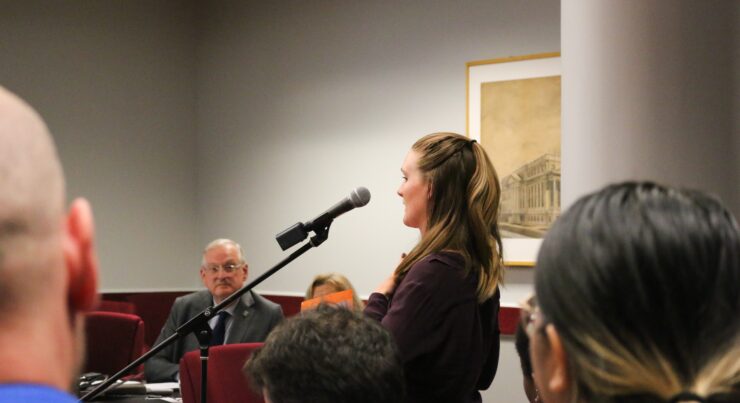University of Ottawa students gathered in the Senate meeting on Monday to push for the cancellations of classes during a global climate crisis protest, but the administration would only go as far as to say it encouraged interested students to attend and will ‘accommodate’ those who do.
The group of about 10 students called on the administration to cut classes Friday from 10 a.m. to 2:30 p.m. so the U of O community could attend the protest inspired by Swedish climate activist Greta Thunberg.
Part of the Global Climate Strike, the event will see protestors gather on Tabaret Lawn for 10:30 a.m. before moving to Confederation Park and heading to Parliament Hill for 11:30 a.m.
I'm at Tabaret Hall with @mattgergyek for the @The_Fulcrum covering the Senate meeting. Several students have gathered for a sit-in. Students are asking for the administration to cancel class on Sept. 27th for the Climate Strike.
— M. Casalino (@mmrcasalino) September 23, 2019
The students came to the meeting holding signs reading “United Behind the Science” and “Activism = Learning.” In the hour before the Senate meeting began, the University of Ottawa Students’ Union shared an open letter “strongly encourag(ing)” the administration to cancel classes.
But midway through the proceedings, the U of O released a statement signed by vice-president (academic affairs) Jill Scott saying it “will maintain regular academic and administrative activities on (Friday) but teaching staff have been directed to accommodate students who wish to participate in the march.”
Students urging cancellation of classes were still given time to speak at the end of the meeting.
“Our focus, our priority is on having a livable future,” said biology graduate student Amber Dyck. “Graduation is great but having a future that we can live in is much better, and not just for us but for people around the world.”
“I still encourage further action, perhaps cancel classes, figure out how you can push the envelope and actually redefine the conventional,” she said to scattered claps.
Several post-secondary institutions and school boards have announced the cancellation of classes during local protests, including Montreal’s Concordia University and Gatineau’s Université du Québec en Outaouais.
A Senate member raised concerns over what accommodations would look like in practice, including what students would do if assignments, quizzes or tests were assigned in a class held during the protest, or if they missed lecture material that would later appear on exams.
U of O president Jacques Frémont said he encourages students to notify their professors and teaching assistants if they will be attending the protest before Friday, but there is no “one size fits all” solution.
He later spoke to a group of students after the Senate meeting, encouraging them to escalate any issues if their professors do not accommodate their absences.
Mary Stuart, a second-year environmental studies student at the U of O, said it was “unfortunate” the university wouldn’t cancel classes, full stop.
“I think it was a huge opportunity for the U of O to be at the forefront of propelling this movement,” she said.
“Going into (the meeting), we didn’t know exactly how things were going to turn out and we didn’t even know (the university was) going to support students in skipping class this Friday, so that’s at least a partial win, and hopefully there will be clear accommodations made.”
The student activists say now is the time for action.
“When the election is coming up right around the corner, this could be incredibly progressive to say ‘yes, take an hour-and-a-half off … vote with your feet, be a part of this movement,’ ” said U of O student Lorin Van Dusen. “It’s saying from the largest body at the university, ‘we are behind this movement, we are using our power to help progress it.’ ”





